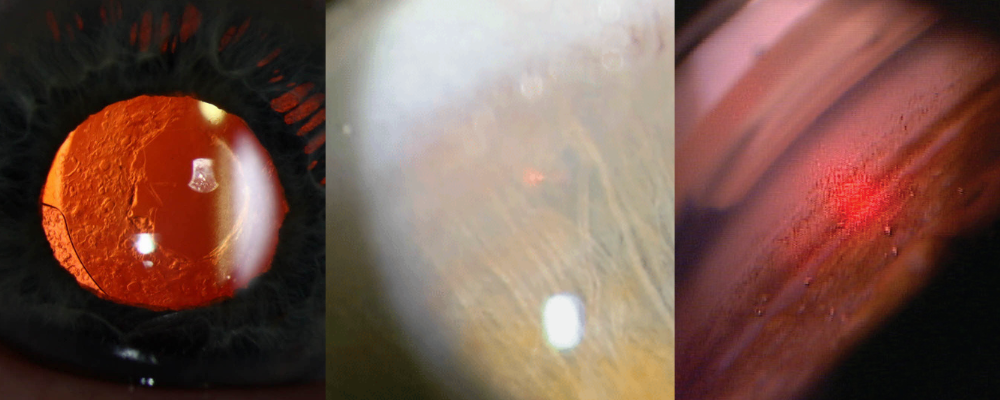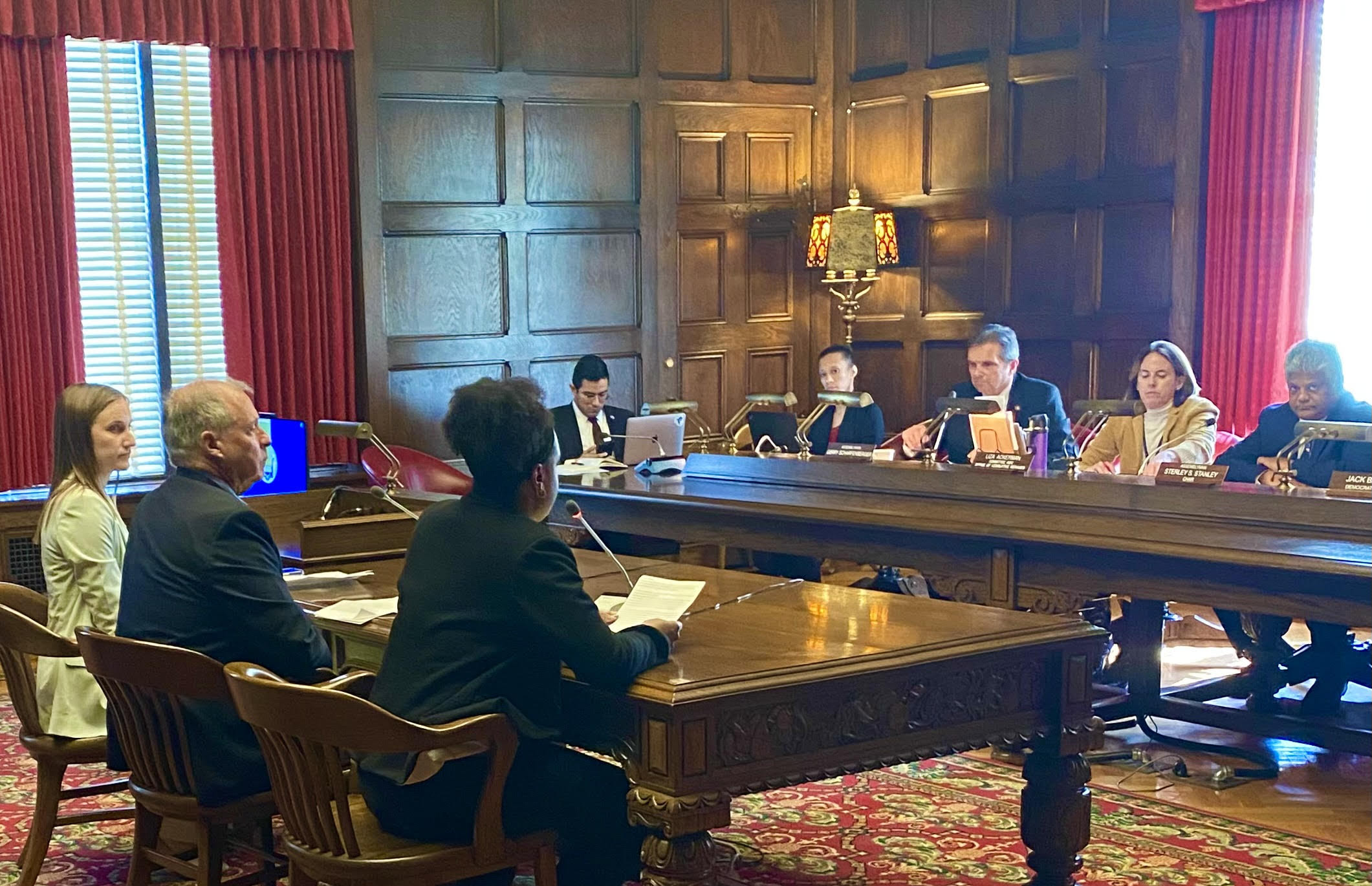In the first two months of 2024, at least a dozen scope expansion bills were introduced or still active from 2023 in states across the US, 10 of which were pursuing the use of optometric lasers. Since then, one laser bill was successfully passed in South Dakota, which now holds the title of the 12th laser state. Four other states have unfortunately lost their legislative battles since January: California, Kansas, Utah and, most recently, West Virginia. These recent events bring the count of active scope bills down to eight. Optometrists in the District of Columbia are pushing for use of controlled substances, while those in in Alabama, Missouri, Nebraska, New Hampshire, New Jersey, Ohio and Vermont are pursuing the use of optometric lasers and other minor surgical procedures.
 |
| Seven US states are still actively pursuing surgical privileges in 2024 such as YAG capsulotomy, LPI and SLT, shown above. Last month, South Dakota ODs earned the right to perform all of these procedures come July 1. Click image to enlarge. |
Bills on the Move
In the cover story of our March issue, we detailed the status of every scope bill in play across the country as of late February. Since that article went to print, legislation in several states has continued to advance. Here are some positive scope updates that have transpired in the last few weeks:
Ohio. Last summer, a bill proposing the modernization of Ohio’s optometric scope of practice—which hasn’t been updated since 2007—was introduced to the state’s Senate Health Committee. The bill, filed as SB 129, proposes to allow Ohio ODs to remove benign lesions, cysts and skin tags, as well as use lasers for capsulotomy, SLT and LPI. Its progress since has been sluggish, given that legislative sessions last two years in Ohio and that the bill had been proposed just prior to the summer recess. Fortunately, it appears things are finally speeding up.
According to the Ohio Optometric Association (OOA), a meeting was held before the Senate Health Committee on February 28, during which members of the OOA Board, students from The Ohio State University College of Optometry and OOA executive director Elizabeth Muckley, OD, were all in attendance to support Senator Jerry Cirino as he provided his sponsor testimony.
Though the OOA notes that it can’t give any further updates at this time, the wheels are being put in motion to move this bill forward. If you’re an OD in Ohio who wishes to help, there’s no better time to reach out to the OOA to learn how you can join the fight! The organization can be reached at info@ooa.org.
Missouri. There are currently two identical laser bills in the running in Missouri—SB 956 and HB 1963—proposing to modernize optometry’s practice scope to include all procedures taught in optometry schools today. While the House bill has remained in the Health Committee, which held a public hearing in February, SB 956 has had some more recent movement; on March 14, the bill was heard by the Senate Governmental Accountability Committee. However, no decisions have been officially reported at the time of this writing.
 |
| The Assembly Regulated Professions Committee voted 6-0 in favor of New Jersey's laser bill, A-920, on March 14. Several optometrists testified during the hearing, including Drs. Kelley Sedlock, Chris Quinn, Jessica Garden, pictured here from left to right. Photo: New Jersey Society of Optometric Physicians. Click image to enlarge. |
New Jersey. Yet another state with two complementary laser bills in play, New Jersey’s efforts are also seeing some action; on March 14, the Assembly Regulated Professions Committee unanimously released the state’s Assembly bill, A-920, proposing expansion of optometry’s practice scope to include modern surgical and laser procedures. A few minor amendments have been made to the bill, one of which removed language that would've permitted the state's board of optometry to oversee future determinations of what is or is not considered a surgical procedure. Now, A-920 is currently on 2nd reading in the Assembly.
The identical Senate bill, S-354, is currently pending in the Senate Commerce Committee, where it’s been residing since last June.
"We are continuing to build support for the bill and hope it will receive further action later in the spring," the New Jersey Society of Optometric Physicians reports.
Recent Losses
While several states cautiously watch their bills advance, others have had their efforts thwarted. In the last month, the following states have had their scope bills pulled from the 2024 session:
Utah. Before this year, the last push to add laser and advanced procedures to Utah’s optometric practice scope happened in 2022. Although that bill had passed through the House, it encountered a delay in the Senate that prevented it from ever reaching the voting stage.
In early February, ODs and the Utah Optometric Association reintroduced a scope expansion bill—SB 210—that, if passed, would have resulted in the modernization of a 30-year-old practice law. However, the effort was ultimately undone just weeks later by ophthalmology’s interference. The bill died on March 1 when the Senate filed the legislation under “bills not passed.”
“Historically, Utah scope bills have always been directed to the Business and Labor committee, and we had initially secured the sponsorship of that committee chair for our bill expecting he would effortlessly progress the bill through his committee and the Senate,” comments Weston Barney, president of the Utah Optometric Association (UOA). “However, Senate President Stuart Adams, previously believed to be supportive of our cause, aligned himself with the ophthalmology society and redirected our bill to a committee chaired by and stacked with medical physicians who oppose all scope expansion unless it benefits the MD/DO community.” Dr. Barney believes, “This move by Pres. Adams was orchestrated to ensure the bill's failure.”
Dr. Barney also detailed some of the heavy-handed demands put forth by the opposition, which he says “were not only excessive but also demeaning to the education and expertise of optometrists. This included the exclusion of SLT and LPI procedures, excessive proctoring requirements, unrealistic oversight, inclusion of an ophthalmologist on the optometry regulatory board, discrimination of part-time and student optometrists and the inability of the local Rocky Mountain Univ. College of Optometry to teach and perform any laser procedures.”
Though SB 210 secured a favorable vote in the Health and Human Services Committee, Dr. Barney reports that it never actually faced a vote by the Senate. Instead, “it succumbed to behind-the-scenes politics and favors extended to the Utah Ophthalmology Society,” he says.
“We ultimately decided that the extensive regulations and demands were too oppressive to gain YAG privileges, and the insincere negotiations seemed to be unfairly tilted when influenced by the Senate President,” Dr. Barney elaborated. “Consequently, we opted to postpone the presentation of SB 210 to the Senate, fearing that some of our previously pledged votes might waver due to the Senate President's influence.”
Another hurdle in Utah’s scope battle, Dr. Barney shared, was difficulty in securing funds to help the association mount an adequate response to ophthalmology’s hostility. He notes with some frustration that other states pursuing scope expansion have had more success in getting financial backing, despite Utah’s comparable circumstances and goals. “Utah optometrists are disheartened to discover that our scope efforts were thwarted by political maneuvering within our own state legislature as well as by our parent organization,” says Dr. Barney. He says the key players in Utah remain hopeful that additional financial support for their scope expansion efforts might come through in the future.
Even though the loss of SB 210 was a body blow, Dr. Barney says the UOA has definite plans to reintroduce the bill in the future, the timing of which has yet to be determined.
Kansas. This rural state introduced companion bills SB 490 and HB 2779 in February proposing to include the following advanced procedures in optometry’s practice scope: lesion and foreign body removal, subcutaneous injections, laser capsulotomy, laser trabeculoplasty and laser peripheral iridotomy.
While the House bill sat in the Health and Human Services Committee, a hearing for SB 490 was held on February 20 before the Senate Public Health and Welfare Committee. No formal verdict has been publicized, but the American Optometric Association reports that the bill will not be moving forward. Keep an eye on our News Feed for more details to come.
West Virginia. After losing a scope battle in 2023, West Virginia ODs experienced a disappointing feeling of déjà vu when this year’s legislative session came to a close before the Senate had a chance to weigh in on laser bill HB 4783, effectively ending its run this year. In February, the bill—which included minor and surgical procedures such as lesion removal, capsulotomy, SLT and LPI—had scored a big win in the House, receiving a 91-2 vote in favor of the legislation. Hopefully, this strong bipartisan support will carry over when the bill ends up back in the hands of the legislature, most likely next year.


